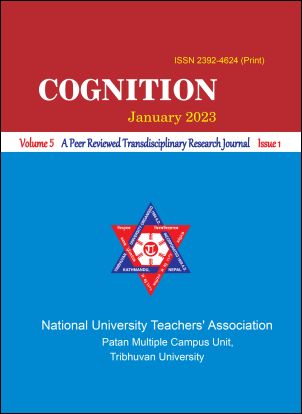Knowledge on Prevention of Myocardial Infarction among Hypertensive Patients in a Hospital of Biratnagar, Nepal
DOI:
https://doi.org/10.3126/cognition.v5i1.55415Keywords:
Knowledge, hypertension, Prevention, Myocardial infarction, Hypertensive patientsAbstract
Myocardial Infarction is an emergent situation characterized by an acute onset of myocardial ischemia that results in myocardial death in lack of prompt definitive interventions. Myocardial Infarction is one of the major complications of hypertension and although it is life-threatening yet it can be prevented. The aim of this study is to assess the level of knowledge on the prevention of Myocardial Infarction among hypertensive patients in a hospital in Biratnagar. A descriptive cross-sectional study was conducted among hypertensive patients in Neuro Cardio and Multispecialty Hospital of Biratnagar. Non-probability purposive sampling method was used to select the sample. Data was collected among 101 hypertensive patients through an interview technique using self - developed, semi-structured interview schedule. Data analysis was done on SPSS version 20.0. Descriptive statistics i.e. frequency, mean and standard deviation, and inferential statistics i.e. chi - square test was used to find the association between dependent and independent variable.
The mean age of the respondents in this study was 56.93 while 62.4% of respondents were male whereas 36.6% of respondents were from Brahmin/Chhetri ethnic group and 67.3% followed Hinduism. Likewise, 49.5% of respondents had completed secondary level education. Similarly, 95% of the respondents identified eating low-fat diet as preventive measures moreover, the findings of this study revealed that 47.5% of respondents had moderate knowledge on the prevention of Myocardial Infarction whereas 46.5% had adequate knowledge while 6.0% of respondents had inadequate knowledge. This study showed that the association between the level of knowledge on the prevention of Myocardial Infarction and sex, education, and occupation was statistically significant. This study concluded that in majority of knowledge on the prevention of myocardial infarction was found to be moderate.




